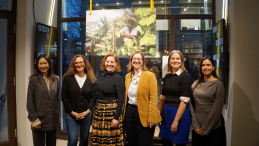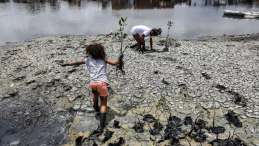On February 14, the United Nations University Operating Unit on Policy-Driven Electronic Governance (UNU-EGOV) welcomed the latest edition of Vitrus Talks, an event organized by Vitrus Ambiente, focusing on the "Impact of Artificial Intelligence on Environmental Action". The session brought together experts, policymakers, and researchers to explore the opportunities and challenges posed by Artificial Intelligence (AI) in the environmental sector.
The discussion highlighted how AI is shaping sustainability efforts, from predictive analytics for climate action to optimizing waste management systems. Opening the debate, Delfina Soares, Director of UNU-EGOV, underscored both the potential and the risks of AI’s integration into environmental governance.
There are notable risks if we consider that we are still trying to understand how algorithms operate. The quality of data used by AI is another major concern because, until now, data reflects reality. Now we are dealing with synthetic data, generated by machines themselves, upon which AI performs computations and produces recommendations. These are issues that must be carefully considered in a continuous debate about their social, environmental, and geopolitical impacts.
Another key concern raised was the environmental cost of AI technologies. Delfina Soares noted that 463 exabytes of data are generated daily, a staggering volume that raises questions about data quality, energy consumption, and resource mining for AI chip production.
Joining the panel were Paulo Novais, Professor at the University of Minho’s School of Engineering, Pedro José Oliveira, Researcher at the ALGORITMI Center/LASI of the University of Minho, Domingos Bragança, Mayor of Guimarães, and Sérgio Castro Rocha, President of Vitrus Ambiente. The discussion covered real-world applications of AI in environmental sustainability, such as smart monitoring of air quality, AI-driven circular economy models, and advanced forecasting for natural disasters.
As AI continues to redefine governance and environmental policies, events like Vitrus Talks contribute to fostering informed discussions that balance technological advancement with ethical and ecological considerations. UNU-EGOV remains committed to supporting digital transformation strategies that align with the UN’s Sustainable Development Goals (SDGs), particularly in the areas of environmental governance and sustainability.




